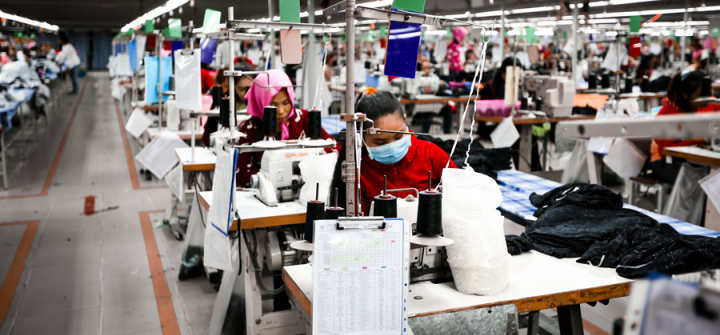Not Your Father’s Oldsmobile: Engaging Corporations on Reproductive Health
Corporations appear willing to make strong, very public stands on controversial issues as never before – most visibly seen in the Super Bowl ads on equal pay, immigration and the environment. In other venues as well, many corporations are also confronting new government policies and making public commitments that go contrary to broader political currents. Something is different.
This moment presents new possibilities for global health advocates to shape the policies and practices of corporations—both at home and abroad, through their suppliers. The global health community needs to ask corporations to do more on reproductive health and rights policy and practice.
In our recent commentary in Globalization and Health, “A Call for Action,” my colleagues and I ask the global health community to think differently about the role corporations can play, through their own operations, in expanding access to reproductive and other health services for both female and male workers.
Many people do not recognize the direct link between global corporations—especially those outside the health sector—and public health goals. In fact, the operations and policies of corporations and their supply chains touch millions of poor workers in low- and middle-income countries and directly affect worker access to general and reproductive health services.
One way to shape the policies and practices of corporations is through Corporate Social Responsibility (CSR) or sustainability standards. These standards arise out of a voluntary or “soft law” global governance system designed to shape the health, environmental and labor practices of corporation and their suppliers. Civil society groups, global organizations and institutions, and national governments as well as corporations influence and monitor this governance system. You encounter it when you buy a bag of coffee at Starbucks with the green Rainforest Alliance frog on it. You hear about it when people talk about a fair trade product or CSR.
We argue that global health advocates should engage in developing policies in this system, which may be unfamiliar to many but is relevant to key Sustainable Development Goals (SDGs). There are good reasons to act now:
- There is momentum to build on. Corporations helped develop the SDGs and continue to make commitments to supporting and promoting the SDGs. A new report released in January by the Business & Sustainable Development Commission defines the business case for the SDGs and asks businesses to take 6 actions, including incorporating them into a company’s core business strategy. It highlights the global goals and “women’s empowerment at every level” as applicable to all aspect of strategy.
- There are additional levers to pull. The World Economic Forum is promoting a “Compact for Responsive and Responsible Leadership” that asks corporate CEOs around the world to sign a statement committing to adhere to long-term strategies and sustainable growth for the benefit of all stakeholders, with the SDGs as a roadmap. Furthermore, the UN Global Compact and the Global Reporting Initiative (GRI) have launched a new effort to promote corporate reporting and public disclosure of contributions to the SDGs.
- The need is great. The highpoint of global cooperation by the US and other governments on reproductive health and rights may have passed. It is estimated that the reinstatement of an expanded Global Gag Rule will contribute to 6.5 million unintended pregnancies, 2.1 million unsafe abortions, and 21,700 maternal deaths. This is a critical moment to find new opportunities for global cooperation that engage corporations on reproductive health.
Reproductive health and family planning can be uncomfortable topics for corporations, much like HIV/AIDS was a generation ago. Global health advocates can help change this. Advocates are the missing link needed to help integrate family planning and reproductive health into supply chain health policies and practices and corporate commitments to women’s empowerment. These policies influence the quality of the health staff at the workplace, their capacity to provide reproductive health and family planning education and counseling, if not services, and workers’ access to external health
We recommend in our Call to Action that the global health community advocate for women’s health in the CSR policy sphere. We call on global health to make corporate standards and CSR policy core issues in the agendas of global forums to advance family planning, women’s empowerment, and the SDGs; to engage global initiatives, like the Business and Human Rights Guiding Principles; and to build on existing relationships and common ground with environmental and labor groups.
One place global health advocates can start: helping to change corporate codes of conduct. With Evidence Project/Meridian as a partner, Business for Social Responsibility is leading the development of a Gender Equality in Codes of Conduct document that will provide guidance to leading organizations that produce corporate codes of conduct and help them mainstream gender equality and women’s health in those codes. You can comment on the draft document here.
David Wofford is vice president of Meridian Group International, Inc. and senior advisor on workplace policies on the USAID-funded Evidence Project, led by the Population Council. With the Evidence Project, he implements the RAISE Health initiative to advocate for corporate and CSR policy change and advance access to reproductive health and family planning for workers in global supply chains.
Join the thousands of subscribers who rely on Global Health NOW summaries and exclusive articles for the latest public health news. Sign up for our free weekday enewsletter, and please share the link with friends and colleagues: Subscribe to GHN
A production line in Cambodia. Image courtesy of Ashish Bajracharya, Population Council




